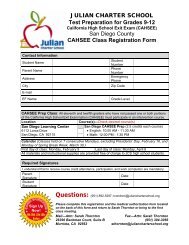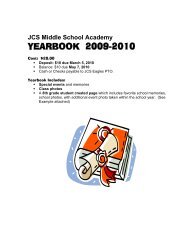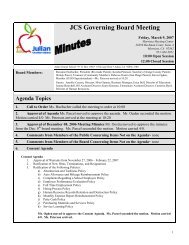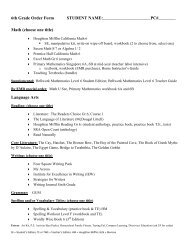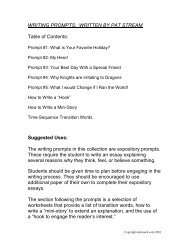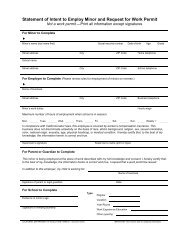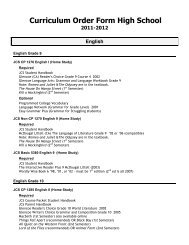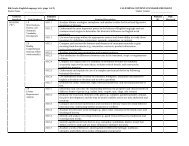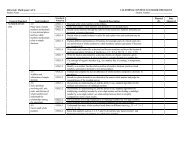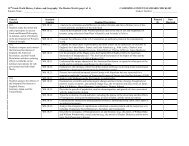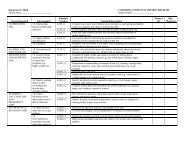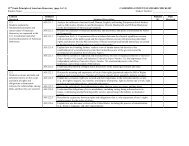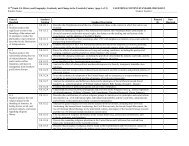2009-2010 Self-Study WASC Action Plan - Julian Charter School
2009-2010 Self-Study WASC Action Plan - Julian Charter School
2009-2010 Self-Study WASC Action Plan - Julian Charter School
Create successful ePaper yourself
Turn your PDF publications into a flip-book with our unique Google optimized e-Paper software.
INSTRUCTIONAL STRATEGIES AND RESOURCES<br />
• Through observations and interviews with teachers,<br />
our self-study shows that educators facilitate student<br />
acquisition of knowledge and skills using a range of<br />
methods. The majority of teachers use three or more<br />
instructional strategies frequently. Strategies are used<br />
in academy lessons, modeled by home study teachers,<br />
and, when possible, taught to home study parents:<br />
• Identifying Similarities and Differences: comparing,<br />
classifying, creating metaphors, creating analogies<br />
• Summarizing and Note Taking: analyzing, synthesizing,<br />
prioritizing data, restating, organizing<br />
• Reinforcing Effort and Providing Recognition: student<br />
self-recognition and goal setting, correlation<br />
between effort and achievement, effective praise,<br />
recognition tokens, pause-prompt-praise method<br />
(practices varies widely)<br />
• Homework and Practice: establishing and communicating<br />
a homework policy (academies), purpose<br />
of homework, student assignment sheets or planners,<br />
commenting on homework, massed and<br />
distributive practice<br />
• Nonlinguistic Representations: creating graphic<br />
organizers, using other nonlinguistic tools (strong)<br />
• Cooperative Learning: elements of cooperative<br />
learning, varying grouping criteria, group size<br />
• Setting Objectives and Providing Feedback: setting,<br />
personalizing, and communicating objectives,<br />
negotiating contracts, using criterion-referenced<br />
and assessment feedback, peer feedback, student<br />
self-assessment (area of growth)<br />
• Generating and Testing Hypothesis: systems analysis,<br />
problem-solving, decision making, historical<br />
investigation, experimental inquiry, invention (in<br />
process with work on 21st century learning)<br />
• Cues, Questions, and Advance Organizers: focusing<br />
important information, explicit cues, asking inferential<br />
and analytical questions, expository and<br />
narrative advanced organizers, skimming, specific<br />
types of knowledge, vocabulary, details, organizing<br />
ideas, skills and processes.<br />
• Students have the tools necessary to organize, access<br />
and apply knowledge.<br />
• EBSCO database available to all students and part<br />
of teacher assignments<br />
• Research papers, portfolios and reflections<br />
• Sample lesson plan<br />
• Classroom observation<br />
• Student notebooks,<br />
journaling, goal setting<br />
sheets, and learning target<br />
checklists<br />
• Links to graphic organizers<br />
• Marzano’s instructional<br />
strategies list<br />
Instructional Cornerstones<br />
to Build Upon:<br />
• Instruction is designed to<br />
connect with all four<br />
learning styles using<br />
various combinations of<br />
experience, reflection,<br />
conceptualization, and<br />
experimentation. Parents<br />
and teachers use: sound,<br />
music, visuals, movement,<br />
experience, and talking.<br />
• Instructional practices<br />
actively engage students in<br />
the planning and implementation<br />
of teaching and<br />
learning activities.<br />
• Educators construct<br />
lessons that enable a<br />
student’s progression from<br />
teacher- or parent-led to<br />
self-directed learning.<br />
• Educators construct<br />
lessons that foster the<br />
ability to “learn how to<br />
learn” (and the application<br />
of this ability to selfmonitor<br />
and improve<br />
learning progress across all<br />
subjects).<br />
• Teacher and student<br />
accounts<br />
• Student work samples<br />
Chapter 4: <strong>Self</strong>-<strong>Study</strong> Findings: Instruction<br />
<strong>Julian</strong> <strong>Charter</strong> <strong>School</strong> Focus on Learning <strong>2009</strong>-<strong>2010</strong> 73



